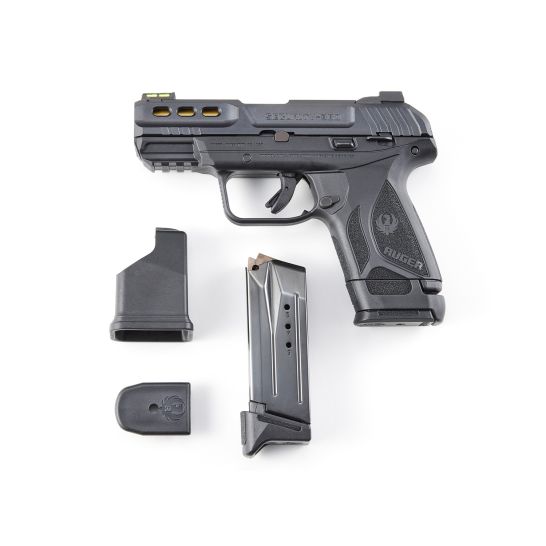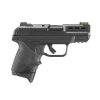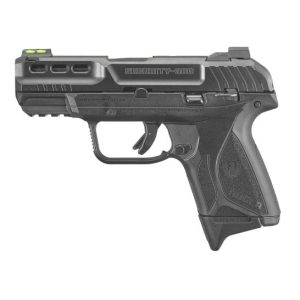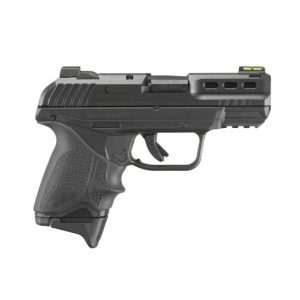Ruger Security .380 ACP 3..42 Semi-Auto Pistol, Black/Gold For Sale
$319.99
The Ruger Security .380 ACP 3.42″ Semi-Auto Pistol merges style, power, and reliability, ideal for concealed carry and personal defense. It features a 15+1 capacity with an additional 10-round magazine for versatile use. The pistol has a compact 6.52″ overall length and a 3.42″ alloy steel barrel with a titanium nitride coating for durability and striking aesthetics. Its ergonomic glass-filled nylon grip ensures comfortable handling, while the through-hardened alloy steel slide finished in black oxide offers durability and wear resistance. Weighing 19.7 ounces, the pistol includes a fiber optic front sight and drift-adjustable rear sight for precise target acquisition. With a slim 1.02″ slide and an accessible height of 4.35″, it is easy to handle and conceal. The 1:10″ right-hand twist barrel with six grooves is engineered for optimal accuracy, making it a balanced choice for everyday carry and rugged performance.
Will a 380 stop an intruder?
The effectiveness of a .380 caliber firearm in stopping an intruder depends on several factors, including shot placement, the type of ammunition used, and the specific circumstances of the encounter. The .380 ACP (Automatic Colt Pistol) round is generally considered to be less powerful than larger calibers like 9mm or .45 ACP, but it can still be effective for self-defense if used properly.
1. **Shot Placement**: Accurate shots to vital areas are crucial for stopping an intruder effectively, regardless of caliber.
2. **Ammunition Type**: Hollow point bullets are often recommended for self-defense because they expand upon impact, creating larger wound channels and increasing stopping power compared to full metal jacket (FMJ) rounds.
3. **Firearm Proficiency**: The ability to handle the firearm confidently and accurately under stress is critical. Regular training and practice can improve effectiveness.
4. **Intruder’s Condition**: The physical condition and determination of the intruder can also affect the outcome. Even with effective shot placement, some individuals may not be immediately incapacitated.
While a .380 can be effective for self-defense, many experts recommend using it as a secondary choice or under specific circumstances where its smaller size and recoil may be advantageous. It’s important to choose the firearm and caliber that you are most comfortable and proficient with for self-defense scenarios. Always consult with a professional for personalized advice and consider legal and safety factors related to firearm use in your area.
Is A 380 enough for self-defense?
The suitability of a .380-caliber handgun for self-defense depends on several factors, including personal preference, comfort with the firearm, and the specific self-defense scenarios you might encounter.
1. **Stopping Power**: A .380 caliber is generally considered to have less stopping power compared to larger calibers like 9mm, .40 S&W, or .45 ACP. While it can be effective for self-defense, its ability to stop an attacker quickly might be less reliable compared to larger calibers.
2. **Concealability**: One of the benefits of a .380 handgun is its typically smaller size, making it easier to conceal. This is advantageous for everyday carry and situations where discretion is important.
3. **Recoil and Control**: A .380 typically has less recoil than larger calibers, which can make it easier to handle, especially for individuals who are newer to firearms or have difficulty managing heavier recoil. This may allow for quicker follow-up shots and greater accuracy.
4. **Ammunition**: Advances in ammunition have improved the performance of .380 rounds. Using high-quality self-defense ammunition can enhance its effectiveness.
5. **Personal Comfort**: Ultimately, the best self-defense weapon is one that the user feels comfortable and proficient with. If you find a .380 to be manageable and can use it accurately and confidently, it can be a suitable option for self-defense.
It’s important to balance these considerations and, if possible, try out different calibers and firearms to determine which one best meets your specific needs for self-defense. Additionally, consistent training and practice are crucial components of effective self-defense, regardless of the caliber chosen.
Is the Ruger Security 380 a striker or hammer?
The Ruger Security 380 is a hammer-fired pistol.
Does a 380 Ruger have a safety?
The Ruger LCP, a popular model in .380 ACP produced by Ruger, does not have a manual safety. Instead, it features other safety mechanisms such as a locked-breech system and a trigger safety. It is always important to review the specific model of firearm for its safety features, as different models may vary.
Will a 380 go through a person?
Yes, a .380 caliber bullet can potentially penetrate a human body, especially if it strikes at close range and hits soft tissue. The extent of penetration and damage depends on various factors including bullet design, range, and the specific area of the body that is hit.
How lethal is a 380 hollow point?
The lethality of a .380 hollow point bullet depends on various factors, including the specific circumstances of its use, such as shot placement, distance, and the physical characteristics of the target. A .380 ACP (Automatic Colt Pistol) hollow point is designed to expand upon impact, increasing its diameter and potentially causing more damage to the target compared to a full metal jacket (FMJ) bullet.
While the .380 ACP is generally considered less powerful than larger calibers like 9mm or .45 ACP, it can still be lethal, especially if it strikes vital organs or major blood vessels. Its effectiveness can be sufficient for self-defense situations at close range when proper shot placement is achieved. However, compared to larger calibers, the .380 ACP may provide less penetration and energy transfer. Always remember that the use of firearms should be approached with caution and a thorough understanding of the laws and regulations governing their use in your area.
Why is .380 illegal?
The legality of .380 caliber firearms and ammunition varies depending on the country or region. In some places, .380 caliber firearms may be restricted or illegal due to specific gun laws that regulate the possession, use, or sale of certain types of firearms and ammunition. This could be due to a variety of reasons, including concerns about crime, safety, or specific legislation aimed at controlling the spread of certain types of firearms. To understand why .380 is illegal in a specific area, one would need to look into the local firearms regulations and laws. If you need more information about a specific region, please let me know!
What are the pros and cons of the 380?
When evaluating the Airbus A380, both its advantages and disadvantages should be considered:
### Pros:
1. **Passenger Capacity**: The Airbus A380 is the largest passenger aircraft in the world, capable of carrying up to 853 passengers in an all-economy class configuration, though typical seating ranges from 500-600 in a three-class layout. This makes it highly efficient for transporting a large number of passengers on high-demand routes.
2. **Comfort**: The spacious cabin allows airlines to offer a variety of seating arrangements and amenities, enhancing passenger comfort. Many A380s feature advanced entertainment systems, onboard bars, and other luxury services.
3. **Range and Efficiency**: The aircraft can handle long-haul flights, connecting major international hubs and reducing the need for stopovers.
4. **Economies of Scale**: The ability to carry more passengers can lead to operational cost efficiencies for airlines on busy routes with high demand, potentially reducing the per-passenger cost.
5. **Stability and Smooth Ride**: Due to its size and engineering, the A380 offers a stable and smooth flight experience, benefiting passenger comfort.
### Cons:
1. **Operational Constraints**: The A380 requires significantly large airport gate, taxiway, and runway facilities, limiting the number of airports from which it can operate. Not all airports have infrastructure like sufficiently long runways or adequately tall jet bridges to accommodate it.
2. **High Operating Costs**: Due to its size, the A380 has higher fuel consumption compared to smaller aircraft, especially on less optimized routes. Additionally, maintenance and operational logistics are more complex and expensive.
3. **Market Demand Changes**: Changing trends in air travel, with an increasing preference for point-to-point flights rather than hub-based travel, have reduced demand for very large aircraft, affecting the profitability of operating the A380 on certain routes.
4. **Resale and Flexibility**: The specialized nature of the A380 means fewer airlines are interested in buying them second-hand, limiting resale options. Also, airlines may find it difficult to fill the plane consistently, especially during economic downturns or low seasons.
5. **Environmental Impact**: Larger aircraft generally have a higher carbon footprint per flight, although this can be offset on a per-passenger basis when the plane is fully utilized. However, finding an optimal balance can be challenging.
Overall, while the Airbus A380 excels in flying large numbers of passengers over long distances comfortably, its use is limited mainly to high-traffic international routes where it can operate efficiently.
What has more stopping power a 380 or a 22?
A .380 ACP generally has more stopping power than a .22 LR. The .380 ACP is a larger caliber with a heavier bullet and higher velocity, leading to greater energy transfer upon impact. This typically results in more effective stopping power compared to the .22 LR, which is a smaller caliber with less energy. However, stopping power can also be influenced by factors like bullet type, shot placement, and the specific situation.
At what distance is a 380 accurate?
A .380 ACP (Automatic Colt Pistol) is generally considered effective for self-defense at close range, typically up to about 7 to 10 yards (21 to 30 feet). Its accuracy can diminish at greater distances, making it less ideal for longer-range shooting compared to cartridges designed for higher velocity and power.
What pistol do bodyguards use?
Bodyguards often use a variety of pistols based on their specific needs, training, and regional regulations. Some popular models include the Glock 19, SIG Sauer P229, Smith & Wesson M&P Shield, and Heckler & Koch VP9. These pistols are favored for their reliability, ease of use, and effectiveness in personal protection scenarios.
Can you put a laser on a Ruger security 380?
Yes, you can put a laser on a Ruger Security-380. There are various laser sight models available that are compatible with the Ruger Security-380, and you can attach them either to the accessory rail (if available) or the trigger guard, depending on the specific laser model. Make sure to check the compatibility and installation instructions provided by the laser sight manufacturer.
What has more stopping power, a 380 or a 22?
A .380 ACP generally has more stopping power than a .22 LR. The .380 ACP is a larger caliber with more energy, which typically results in greater effectiveness for self-defense situations compared to the smaller .22 LR. However, stopping power can also depend on factors such as bullet design, shot placement, and the specific situation.
What is the best self-defense ammo for a 380?
The best self-defense ammo for a .380 ACP typically emphasizes reliability, expansion, and penetration. Some popular choices among firearm enthusiasts include:
1. **Hornady Critical Defense:** Known for its consistent performance and reliable FTX bullet design, which aids expansion.
2. **Speer Gold Dot:** Offers bonded jacketed hollow points that ensure good weight retention and controlled expansion.
3. **Federal HST:** Features reliable expansion and deep penetration, often recommended for defensive situations.
4. **Remington Golden Saber:** Provides reliable performance with a designed hollow-point that assists expansion and penetration.
5. **Winchester Silver Tip:** Known for its effective expansion and stopping power due to its unique bullet design.
Testing these options in your specific firearm is essential to ensure reliability and accuracy, as different guns can perform differently with varying ammunition types.
What is the best caliber for self-defense?
The best caliber for self-defense is subjective and depends on various factors such as personal preference, ease of handling, availability, and stopping power. Commonly recommended calibers for self-defense include 9mm, .40 S&W, and .45 ACP due to their balance of power, capacity, and manageable recoil. It’s important for individuals to try different options to see what works best for them and to consider factors such as firearm size, ammunition cost, and local regulations. Proper training and practice with the chosen caliber are also crucial for effective self-defense.
| Model | Security .380 |
|---|---|
| Overall Length | 6.52" |
| Barrel Material | Alloy Steel |
| Barrel Finish | Titanium Nitride |
| Magazines Included | (1) 15rd and (1) 10rd |
| Front Sight | Fiber Optic |
| Rear Sight | Drift Adjustable |
| Slide Material | Through-Hardened Alloy Steel |
| Slide Finish | Black Oxide |
| Twist | 1 |
Be the first to review “Ruger Security .380 ACP 3..42 Semi-Auto Pistol, Black/Gold” Cancel reply
Related products
Ruger Security-380
Ruger Security-380 .380 ACP Pistol, 3.42" Barrel, Adjustable Fiber Optic Sights, Black – 3855
Ruger Security-380




Reviews
There are no reviews yet.